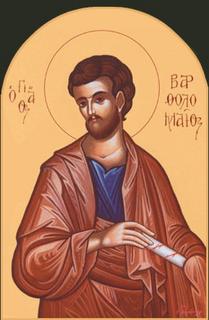This is a continuation of the the 73 Steps to Spiritual Communion with God by Michael Dubruiel, the previous posts are available in the archives to the right. This is step 53.
(53) Not to love much speaking.
Recently while a guest at the monastic table of a monastery I was privileged to be there on a night when talking was allowed in celebration of the feast of the Sacred Heart of Jesus. Normally meals are taken in silence at this monastery, while a monk reads from the Rule of St. Benedict, the martyrology and usually a book that would be of interest to the monks (this final selection could be a current bestseller).
So on this night, after the blessing was said and we were seated there was a few minutes of silence while the lector read from the Rule and the martyrology before the abbot rang a bell signaling that we could speak. The one line that was read from the Rule was "not to love much speaking."
I was seated with a monk who I had meant several times before, Father Louis, in his late 70's he still leads a very busy life wearing a number of "hats" at the monastery not the least of which is to entertain guests. He told me that two of his heroes were fallen and that made him sad.
"Who were they?" I asked.
"President Clinton and Archbishop Weakland." He responded.
He went on to say that Clinton had been for the poor and for the life of me I can't remember what Weakland had done that enamored him to Father Louis, although Weakland was also a Benedictine monk so that probably had something to do with it.
We carried on a conversation about current projects that I was working on and Father Louis weekend parish work. It was an ironic visit, because we were both doing the very thing that Benedict counsels the monk not to do "to love much speaking."
Why? Too often when we speak much we say things that might better be left unsaid. If Benedict were writing today, he might also add not "to love too much blogging" which could easily be a modern equivalent to "too much speaking." Bloggers know that writing what you are thinking can come back to bite you sometimes.
God first, everything else second. We are to pray always, even before we speak. "God is this going to build the person up?" "Lord is this your will?" All should proceed what might flow too quickly from our lips and not be according to God's will for us.
The flip side of course is that someone who loves to talk will hardly make a good monk. Since monks thrive on silence (and we should nurture ourselves with this too), someone who loves to talk obviously would be miserable in such a setting.
(53) Not to love much speaking.
Recently while a guest at the monastic table of a monastery I was privileged to be there on a night when talking was allowed in celebration of the feast of the Sacred Heart of Jesus. Normally meals are taken in silence at this monastery, while a monk reads from the Rule of St. Benedict, the martyrology and usually a book that would be of interest to the monks (this final selection could be a current bestseller).
So on this night, after the blessing was said and we were seated there was a few minutes of silence while the lector read from the Rule and the martyrology before the abbot rang a bell signaling that we could speak. The one line that was read from the Rule was "not to love much speaking."
I was seated with a monk who I had meant several times before, Father Louis, in his late 70's he still leads a very busy life wearing a number of "hats" at the monastery not the least of which is to entertain guests. He told me that two of his heroes were fallen and that made him sad.
"Who were they?" I asked.
"President Clinton and Archbishop Weakland." He responded.
He went on to say that Clinton had been for the poor and for the life of me I can't remember what Weakland had done that enamored him to Father Louis, although Weakland was also a Benedictine monk so that probably had something to do with it.
We carried on a conversation about current projects that I was working on and Father Louis weekend parish work. It was an ironic visit, because we were both doing the very thing that Benedict counsels the monk not to do "to love much speaking."
Why? Too often when we speak much we say things that might better be left unsaid. If Benedict were writing today, he might also add not "to love too much blogging" which could easily be a modern equivalent to "too much speaking." Bloggers know that writing what you are thinking can come back to bite you sometimes.
God first, everything else second. We are to pray always, even before we speak. "God is this going to build the person up?" "Lord is this your will?" All should proceed what might flow too quickly from our lips and not be according to God's will for us.
The flip side of course is that someone who loves to talk will hardly make a good monk. Since monks thrive on silence (and we should nurture ourselves with this too), someone who loves to talk obviously would be miserable in such a setting.
But the counsel is beneficial to all of us. "Think before you speak," becomes "Pray before you speak."








